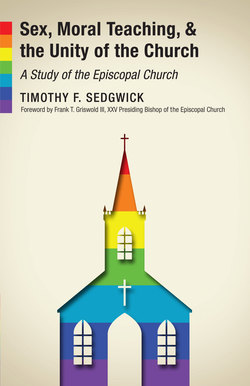Читать книгу Sex, Moral Teaching, and the Unity of the Church - Timothy F. Sedgwick - Страница 6
На сайте Литреса книга снята с продажи.
ОглавлениеForeword
In the Gospel of John, Jesus tells his disciples, “I still have many things to say to you, but you cannot bear them now. When the Spirit of truth comes, he will guide you into all the truth. … He will take what is mine and declare it to you.” Truth, therefore, according to the one who declares, “I am the truth,” is not simply given, but unfolds over time according to what our fragile humanity can bear, in the sense of appropriating it and making it our own. Truth is also personal and relational: when Jesus says he is the truth and that the Spirit will draw from him what is his and declare it to his friends, he is speaking of his abiding relationship with them as the ground of their ability to grow in the truth. He is not saying I will tell you the truth, but that we, his followers, must live into the truth through union and communion with him. Such union and communion are not, however, a solitary relationship, but a communal experience of life and discernment: they are ecclesial. The well-known Orthodox theologian John Zizioulas, Metropolitan of Pergamon, observes that truth is discovered “in communion,” that is with others who, through baptism, have become limbs of Christ’s risen body and together, in all their singularity and difference, constitute the church.
Moral teaching, as Timothy Sedgwick makes plain, is grounded in the life and worship of the Christian community. As such, it is a dynamic process rooted and grounded in prayer and sacrament and the embodiment of the gospel in the lives of those who are bound together “in solidarities not of our own choosing,” as Rowan Williams describes what it means to be baptized into Christ.
Life in Christ, as Sedgwick observes, is rooted in the life of the Trinity, into which we are drawn by the Holy Spirit: a life of overflowing self- forgetting love. Consequently, moral teaching and ethics cannot be reduced to a simple declaration of “who is right.” Just as the union of persons within the Trinity presupposes difference, that is an Other to love, so too in the body of Christ unity presupposes difference and distinction. As Paul declares, if all limbs of the body were the same, there would be no body. The hand needs the difference of the eye in order for the body to be complete.
Focusing on the issue of sexuality, which has so overtaken and polarized churches of the Anglican Communion and other Christian households of faith, Sedgwick guides us through a careful and thoughtful consideration of how this need not be a source of division. He offers in these pages a theological grounding for a way forward such that we can learn from one another and discover that, even with our different perspectives, we are being drawn together by the Spirit into deeper union—koinonia—with the One who is the truth.
Frank T. Griswold
25th Presiding Bishop of the Episcopal Church
